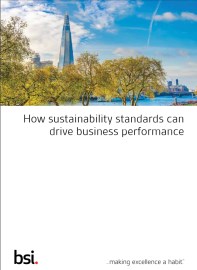
by Brianna Crandall — April 18, 2014—BSI, the U.K.-based business standards company, recently worked with independent energy, environment and sustainability analysts Verdantix to discover how the challenge of sustainable development is really being addressed by U.K. businesses. Verdantix conducted a survey among 150 executives from 20 industry sectors including retail and consumer products, consumer services, manufacturing, business and financial services, oil and gas, utilities and mining.
The Verdantix survey found that although 70% of businesses identified sustainability as a key driver for growth, only 51% believe that sustainability issues will impact their firm’s financial performance over the next two years. However, those who have made the connection between sustainability and business performance are willing to invest in internal teams to manage and deliver sustainability. A full 81% of the respondents said that they have more than five staff members dedicated to sustainability at a program management level.
The research also found that sustainable development is still high on business agendas regardless of size and sector, with many organizations already using ISO 14001 Environmental Management and ISO 50001 Energy Management System standards. However, the survey determined that businesses differ in their approach, maturity, interest from executives, and resources available for sustainability.
Susan Clarke, industry analyst at Verdantix, said, “It is clear that standards can alleviate some of the difficulties that many businesses face on their sustainability journey, simply by providing repeatable procedures and processes. They enable them to install clarity about the steps businesses should take to make themselves more sustainable, and allow them to improve sustainability performance and efficiency on the whole.”
The real litmus test for commitment to sustainability, however, comes from the number of management plans and programs being implemented by firms, says BSI. Of the respondents, 37% said that sustainability spend will remain flat in the next financial year, while the remainder are confident of budget increases: 31% said they expect an increase of up to 5%; 23% predict an increase of 5-10%; and 1% believe there will be an increase of 10-30%.
According to the survey results, sustainability performance reporting is also coming up high on the agenda, with most firms allocating resources to enable more comprehensive and accurate analysis. This is now common practice for large U.K. firms, and 100% of those surveyed plan to publish a sustainability report in 2014, with 91% integrating financial and sustainability data into their annual report. The most commonly reported sustainability data will be carbon emissions (99%), energy (98%), and social responsibility (93%). A large majority will report on waste (77%), water (77%), and other greenhouse emissions (77%).
David Fatscher, head of market development for sustainability at BSI, commented, “Although the results show broad acceptance amongst organizations that sustainability is a relevant issue, British industry still has plenty more to do before sustainability becomes business as usual. But we are encouraged that reporting performance on sustainability metrics such as energy, carbon and social responsibility is moving up the agenda.”





